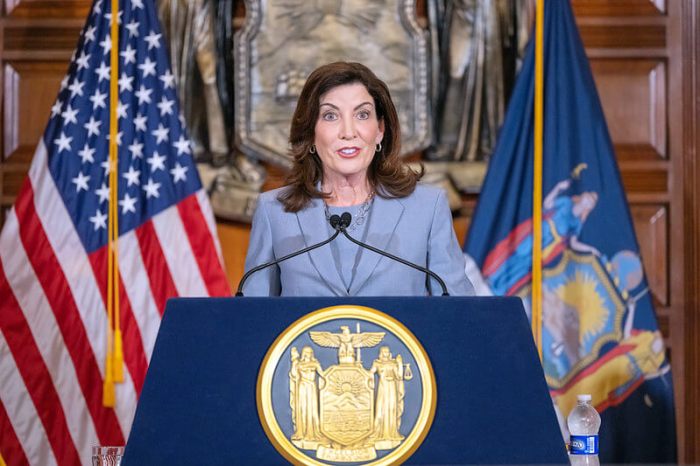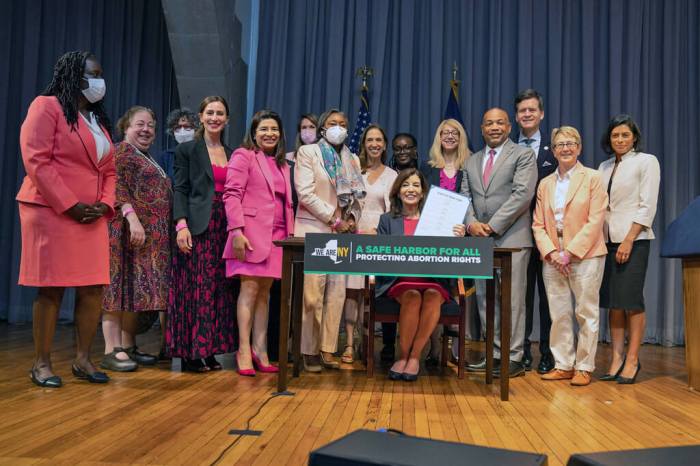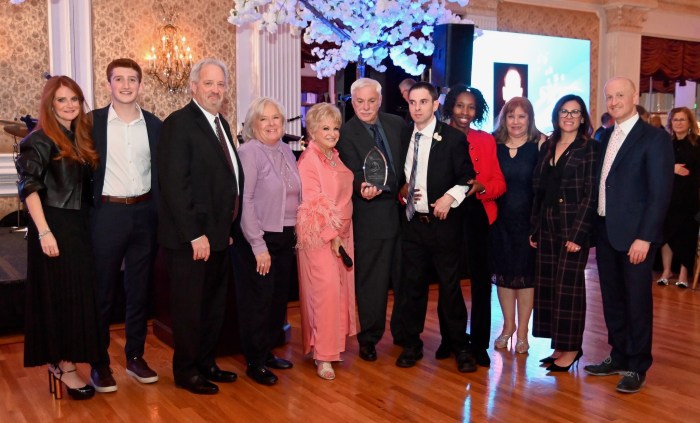Gov. Kathy Hochul on Monday announced the new City University of New York (CUNY) Harry Belafonte Scholarship to honor the legacy of civil rights activist and world-renowned musician Harry Belafonte, who passed away earlier this year.
The governor made the announcement at the 2023 West Indian Day Parade.
“The son of Jamaican immigrants, Harry Belafonte was an incredible artist, activist, and voice for the people of New York,” Hochul said. “To honor his legacy, this scholarship will open the door to new opportunities and help ensure more passionate and talented students can make their mark on the world, debt free.”
Belafonte was born Harold George Bellanfanti, Jr., on Mar. 1, 1927, at Lying-in Hospital in Harlem, the son of Jamaican-born parents Harold George Bellanfanti Sr. (1900–1990), who worked as a chef, and Melvine Love (1906–1988), a housekeeper.
There are disputed claims of his father’s place of birth, which is also stated as Martinique, a French territory in the West Indies, according to Wikipedia, the free online encyclopedia.
Belafonte died on April 25, 2023.
“Harry Belafonte was a giant of a man. He broke barriers and uplifted communities through the power of the arts and activism,” said Lt. Gov. Delgado. “I thank Gov. Hochul for honoring his legacy through investing in our youth, which will provide them the tools to inspire change themselves.”
Hochul said this new scholarship will cover the full cost of attendance – including tuition, room and board, fees, books and supplies, transportation, and personal expenses – for five CUNY students who, like Harry Belafonte, “demonstrate a commitment to social justice and the performing arts, have overcome significant challenges to pursue their dreams, and embody the experiences and principles that he represented.”
The governor said applications will open in Spring 2024.
CUNY Chancellor Félix V. Matos Rodríguez said, “CUNY thanks Gov. Hochul for honoring the memory of Harry Belafonte with this generous scholarship that will help our students pursue educational paths that bring together the passions for the arts and social justice that he championed throughout his long and illustrious life.”
Gina Belafonte, daughter of Harry Belafonte, said, “We are absolutely honored and thrilled that New York State is recognizing the legacy of Harry Belafonte. How a high school dropout, his desire for learning, and the tools for deeper strategic understanding never ceased.
“By offering this opportunity to those who are deeply interested in furthering your education, and deepening their understanding of art and activism, and the role it plays in creating healthy communities is a profound recognition of his legacy,” she added. “We want to thank Gov. Hochul for shepherding this scholarship and ensuring young people get an opportunity to thrive.”
Belafonte was a world-renowned musician, artist, and champion of the civil rights and social justice movements.
“Like so many New Yorkers, his parents worked hard to ensure he had the opportunity to make a difference in the world,” Hochul said. “This scholarship will help more students who have defied the odds succeed, create a lasting legacy, and make a difference in the lives of New Yorkers.”
Last month, New York City Mayor Eric Adams posthumously awarded a Key to the City of New York the legendary Caribbean performer for his decades of entertainment in music, film, theater and television, as well as his leadership on national civil rights issues, which included playing a major role in the March on Washington nearly 60 years ago.
Known as the “King of Calypso,” Adams said Belafonte was “a singular, multigenerational, international cultural trailblazer.
“The legacy of Harry Belafonte — from music to movies to civil rights — is unparalleled,” he said. “He balanced artistry and activism with a voice that pushed through racial boundaries and transcended the confines of the recording studio.
“When daylight comes, and we can all go home, it’s because Harry led the way in letting the light shine through,” Adams added. “I am honored to present Harry Belafonte, through his family, with a Key to the City of New York.”
Adams said Belafonte was one of the most prolific performers in history.
Belafonte served in World War II before training at the American Negro Theatre.
He received a Tony Award for starring in the Broadway revue “John Murray Anderson’s Almanac: A Musical Harlequinade” in 1954, followed by an Emmy Award — the first for an African American performer — for his CBS special, “Tonight with Belafonte.”
During this time, Belafonte also starred in movies and launched his recording career, releasing the breakthrough album “Calypso” in 1956, which included “Day-O (The Banana Boat Song)” and “Jamaica Farewell”, and introduced mainstream audiences to calypso music.
Belafonte would go on to win numerous additional accolades — becoming one of the few to earn the “EGOT” title, meaning he’s won Emmy, GRAMMY, Oscar, and Tony awards.
Belafonte was a two-time GRAMMY Award winner and a recipient of the Kennedy Center Honors in 1989, the National Medal of Arts in 1994, and the Academy Awards’ Jean Hersholt Humanitarian Award in 2014.
Offscreen, Belafonte dedicated his career towards social justice and civil rights.
A dynamic force during the Civil Rights Movement, Belafonte played a major role in the March on Washington in 1963.
He spearheaded numerous national and international initiatives — such as the recording of the charity single “We Are the World” for African famine relief — and served as a UNICEF Goodwill Ambassador from 1987 till his death in 2023. Belafonte passed away earlier this year, on April 25, 2023.
The Key to the City of New York was first awarded in 1702 by New York City Mayor Phillip French, when he offered “Freedom of the City” to Viscount Edward Cornbury, the then-governor of New York and New Jersey.
By the mid-1800s, it became customary to award the Key to the City of New York as a direct symbol of the city’s wish that a guest feel free to come and go at will.
“Today, the Key to the City of New York is a beloved symbol of civic recognition and gratitude reserved for individuals whose service to the public and the common good rises to the highest level of achievement,” Adams said.



















